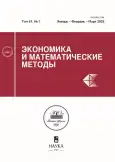Decarbonization of the global transport sector in a post-Covid perspective
- Авторлар: Prudnikova A.A.1, Khmyz O.V.2, Sergeeva N.V.1
-
Мекемелер:
- Financial University
- MGIMO University
- Шығарылым: Том 61, № 1 (2025)
- Беттер: 38-44
- Бөлім: World economy
- URL: https://journals.rcsi.science/0424-7388/article/view/287695
- DOI: https://doi.org/10.31857/S0424738825010045
- ID: 287695
Аннотация
The article is devoted to the urgent problem of decarbonization of the transport sector at the international level, because transport generates the bulk of greenhouse gas emissions in the 21st century. The aim of the research is to assess the impact of global decarbonization trends on individual types of transport and predict the likely scale of emissions until 2030. Current trends are analyzed taking into account the impact of lockdowns during the COVID-19 pandemic, due to restrictions on the movement of individuals and vehicles, which led to a decrease in the overall level of air pollution and emissions CO2 and other gases, and post-pandemic times, that demonstrated the restoration and simultaneous reformatting of global supply chains disrupted in the previous years. Developing the provisions of theoretical research on decarbonization issues, based on current statistical data, the authors of the article built predictive models of the dynamics of emissions by transport subsectors. The analysis showed the need to continue the global decarbonization trend, a significant contribution to which can be made by land road transportation (generating the maximum level of pollution for all types of transport) and the increased use of environmental composite components. A shift to greater use of environment-friendly modes of transport (electric vehicles) and sustainable transport technologies will help improve the global climate.
Толық мәтін
Авторлар туралы
A. Prudnikova
Financial University
Хат алмасуға жауапты Автор.
Email: AAPrudnikova@fa.ru
Ресей, Moscow
O. Khmyz
MGIMO University
Email: khmyz@mail.ru
Ресей, Moscow
N. Sergeeva
Financial University
Email: sergeeva69@mail.ru
Ресей, Moscow
Әдебиет тізімі
- Cheema-Fox A., Realmuto LaPerla B., Serafeim G., Turkington D., Wang H. (2021). Decarbonizing everything. CFA Institute. doi: 10.1080/0015198X.2021.1909943
- Henze V. (2021). Getting on track for net-zero by 2050 will require rapid scaling of investment in the energy transition over the next ten years. Bloomberg NEF.
- IPCC (2018). Summary for policymakers. In: Global Warming of 1.5°C. An IPCC Special Report on the impacts of global warming of 1.5°C above pre-industrial levels and related global greenhouse gas emission pathways, in the context of strengthening the global response to the threat of climate change, sustainable development, and efforts to eradicate poverty. V. Masson-Delmotte et al. (eds.). Cambridge (UK), New York (USA): Cambridge University Press, 3–24. doi: 10.1017/9781009157940.001
- ITF (2021). ITF Transport Outlook 2021. Paris: OECD. 249 р. doi: 10.1787/16826a30-en
- Khmyz O. V., Pastukhova D. R., Prudnikova A. A. (2023). Global green bond market amid global turbulence. In: E. G. Popkova (ed.). Smart green innovations in industry 4.0 for climate change risk management. Environmental Footprints and Eco-design of Products and Processes. Cham: Springer. 605–613. doi: 10.1007/978-3-031-28457-1_61
- Lebrand M., Theophile E. (2022). Rising incomes, transport demand, and sector decarbonization. doi: 10.2139/ssrn.4122856
- Neugebauer S. (2019). Technical scenarios for the decarbonization of road transport. In: M. Bargende, H. C. Reuss, A. Wagner, J. Wiedemann (eds.). Internationals Stuttgarter symposium. Proceedings. Wiesbaden: Springer Verlag. doi: 10.1007/978-3-658-25939-6_4
- Noussan M., Hafner M., Tagliapietra S. (2020). The future of transport between digitalization and decarbonization. Springer. doi: 10.1007/978-3-030-37966-7









